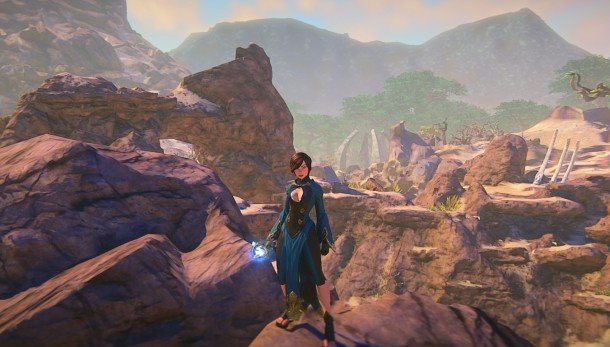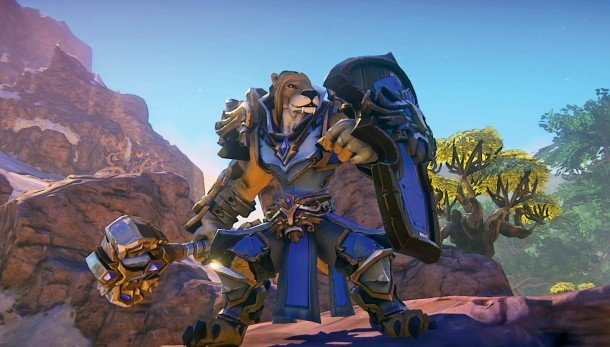Everquest Next first look: a bold, destructible fantasy MMO

It's a radical rethinking of the way MMOs are made. EverQuest II has been experimenting with player-generated content for years, but nothing on this scale, and by and large the series is known as a preserve of the old guard: first-gen MMOers for whom EverQuest has provided a steady backdrop for 14 years of life.
After the public announcement of EverQuest Next at SOE Live in Las Vegas, I wandered the showfloor and spoke to veteran players about whether SOE's new vision resonated with them. A retired engineer told me that the inclusion of creative tools would provide a way into a series that had meant a lot to his family but that he'd struggled to find a place for himself in. A group of younger raiders said that they'd absolutely beat their swords into pickaxes for a chance at getting a dungeon design into the game.
Surprisingly, few seemed bothered that the lore they'd invested years in was being shelved. Where I did encounter negativity, it stemmed from the game's art style. EverQuest Next's character design looks like a DreamWorks cartoon: characters are big-eyed and proportioned to express mood and action at a distance. For players invested in old EverQuest's relative realism, it's a disappointment: and, crucially, it's a part of the game where (for now) the community does not have creative input.
On the other hand, the way EverQuest Next plans to revamp MMO content has the potential to restore some of the mystery of those early days. An emergent AI system gives each monster attributes that determine the type of environment they like: the example given was a group of orcs, who will gravitate towards isolated roads but avoid settled towns and guards. The developers won't position these monsters manually: they'll constantly be assessing the world against their preferences. This allows players to intervene to make areas less attractive to monsters – 'killing them all the time' is one potential scenario in which this would be the case – and as a result the positioning of enemies in the world will change dynamically. In this way, players will see their actions reflected in the world.
If players choose not to act, they'll see the effects of that too. I talked to lead designer Darrin McPherson about the consequences of leaving a crucial road between towns unguarded. “There's no trade,” he says. “The banks close. It's a ghost town – the people move out, or are terribly depressed. We don't have to write it in text.”

A sense of direction is provided by game-wide public quests called Rallying Calls. These will take place server by server and run over a period of two to three months, setting players a broad objective that breaks down into smaller tasks. The example given was founding a city: players will build the walls, clear the surrounding area and secure the town against eventual invaders. Although the strict beats of these events will be set by the developers, the shape their solutions take will be player-determined – and, most importantly, permanent. Once a Rallying Call is finished it'll never be repeated, and SOE are planning the game months in advance.
Return in five years, and the cities you see may well have been built by players during a previous Call. If it works, this will be revolutionary: combining EVE-style dynamism with the reliability of a developer's steering hand. It's not simply that SOE are promising a responsive world: even at this early stage, they're demonstrating the skill to back it up.
Keep up to date with the most important stories and the best deals, as picked by the PC Gamer team.
Once upon a time, players believed that MMO worlds would respond to what they did in them. Over the years, that promise has been eroded and replaced with other systems and other ways of rewarding the player. EverQuest Next promises to restore some of that initial optimism, and we hope that it succeeds: if it does, the ground is about to collapse beneath this long-stagnant genre.
Joining in 2011, Chris made his start with PC Gamer turning beautiful trees into magazines, first as a writer and later as deputy editor. Once PCG's reluctant MMO champion , his discovery of Dota 2 in 2012 led him to much darker, stranger places. In 2015, Chris became the editor of PC Gamer Pro, overseeing our online coverage of competitive gaming and esports. He left in 2017, and can be now found making games and recording the Crate & Crowbar podcast.


